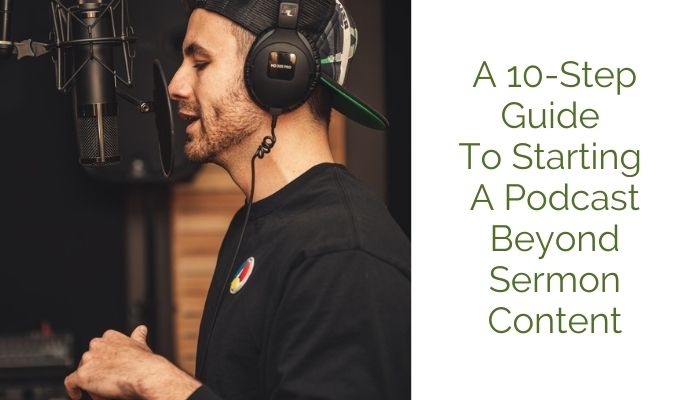Following this 10-step guide to starting a podcast will give you the overview you need. Whether you're producing a podcast based on sermons or other original content, this guide will provide the framework you need to start your podcast.
You might have noticed that podcasting is the new radio. How we consume content today is personalized and easily attainable, and podcasting is the perfect combination of both traits.
Podcasting is hard. It takes work. It takes consistency. But I believe if you want to grow an audience and reach more people with your message, launching a podcast is a fantastic option to do that.
So, should you start a church podcast repurposing the sermons from your pastor?
I think you SHOULD, yes.
Churches are content machines — you’re cranking out tons of fresh content every single week. Repurposing that content into a different form for audiences to consume is a no-brainer.
Should you start a non-sermon podcast?
Yes, I think you COULD.
You can easily produce a non-sermon podcast with a different style and with different voices besides your teaching pastor.
Here are the 10 steps and questions to think through in order to successfully start a podcast.
1: Start a podcast with the question, “Why?”
When deciding on whether to launch a podcast, you need to first determine your purpose. You will probably find that with everything involved in producing and distributing a podcast, it is going to take longer and require much harder work than you might realize.
Start by asking yourself:
- What do I have to say?
- Is this a hobby or am I building a platform?
- Why am I doing this?
Think through your goals for your production and develop a strategy.
2: Create a podcast theme.
I would suggest creating a theme for your podcast and filter each topic or show through the lens of that theme.
I've produced a podcast for 5 years, and here is our theme: The Making Sunday Happen Podcast is the definitive podcast for helping church leaders and volunteers who plan, create, and execute worship experiences at churches around the world.
Simply put: We help you transform your worship experience.
Everything must filter through that theme. I ask the question, “Does this topic/guest/question help church leaders transform their worship experience?”
If the answer is no, it doesn’t get on the podcast.
I’ve made some exceptions and some mistakes getting there. I’ve let some things pass through that filter when I should not have. But the more experienced I get, the more focused I am about making sure everything fits through the filter.
This may mean you need to say “no” to incredible guests or topics because they do not pass through your filter.
Pro tip: If you don't want to pass up a great interview, consider giving it an online home somewhere else, like your personal social media pages or other platform.
3: Know your podcast format and length.
- Is this a podcast of only you, or you and a co-host talking?
- Is this a podcast mostly consisting of you interviewing a guest?
- What is the desired length of each episode?
- Is it audio only or video?
- What is the framework of your show?
Determine a Show Layout Before You Start Your Podcast
Every episode should run on a similar template. For instance:
- Teaser: Introduce the episode number and name.
- Show Open: Make a general introduction or use a pre-made intro.
- Intro: Brief introduction to the show and the topic of the episode
- Commercial Spot #1: Consider sharing a sponsor video or talk about the sponsor of the episode.
- Interview or Main Content: This is the meat of the episode where you share an interview or primary material.
- Commercial Spot #2: This spot is for another commercial, a plug for our platform, a plug for the episode show notes, or other promotional material.
- Closing and Mailbag Segment: Here, you can close out the episode with information about where they can find more about the show and the topic and what’s coming the next week. Maybe use this segment to answer listener questions.
- Show Close: Share your website or contact information and other information about your ministry.
4: Start a podcast with consistency.
Are you going to produce a monthly podcast? Weekly? Seasonal? Decide that now and stick to it. Here are three options:
- Weeklyd
- Monthly
- Seasonal
I would not suggest you releasing episodes “when you can.” In other words, be consistent with your audience. Tell them when to expect content.
If your show is weekly, it's wise to release a show every week on the same day. Otherwise, you will likely lose your audience. When in doubt, I would produce less content and increase the amount later, rather than promise content and not deliver.
When starting a podcast, under-promise and over-deliver. You can always release more content later. Click To Tweet5: Plan and produce your podcast in bulk.
My best pro tip is to plan and produce in bulk.
To begin, map out your podcast calendar for months and months in advance. It's not uncommon for production teams to have the airing schedule, guest arrangements and sponsors prepared for the next 6-8 months at a time.
You may not have the segments or interviews recorded, but you'll know your theme and direction. This doesn’t mean you are tied to every detail, but it's much easier to tweak the calendar than to create the calendar each week.
Managing YouTube videos? Read YouTube SEO: How to Title Your Church YouTube Videos to Get More Views.
6: Launch your podcast efficiently when you outsource your editing.
One method that allows you to produce a lot of high quality episodes and for you to focus on the content for each show is to outsource the audio or video editing of your podcast.
Teams of audio composers and motion designers are available who can produce every episode of your show. These teams require audio and video recordings and then handle the other work, which allow you to focus on the primary content and growing your content.
On YouTube? How to TITLE Your Church YouTube Videos to Get More Views
7: Start your podcast with the right gear.
You’ll want to spend a little bit of money getting good gear to capture a solid recording.
You can use the built-in camera on your laptop if you need to record video. Both audio and video are very important, but I would focus the most on getting quality audio.
Again, with outsourcing the editing of your podcast, all you need to do is have a great setup, capture great audio and video, and send your files to your editor.
8: Consider how you will distribute your podcast.
There are several great podcasting platforms that you can host your podcast with that will take care of distributing your audio or video files to all the platforms you would like your podcast on.
Here are my recommendations:
9: Find time to promote your podcast.
- Social media. Be sure to create social media accounts for your platform where you can share each podcast episode and material from each guest.
- Email. Use a service like MailChimp to create an email list where you can send fresh episodes of your podcast to your audience straight to their inbox.
10: Repurpose the great content you've created.
Another trick to accomplishing more is to find as many ways to repurpose your podcast content as you possibly can.
Use the content from your podcast for:
- Blog posts
- Smaller segments for social media
- Social media quotes
- Ebooks
Most of the time, your audience is not going to consume your content the same exact way. Some people like to read, some like to listen, some like to watch. Take advantage of this and repurpose one piece of content in as many ways as you can think of.
Repurpose your podcast content to appeal to a wider audience. Turn it into a blog article for the readers, a YouTube video for the watchers, and social media content for the people who prefer small snippets of great content. Click To TweetThere you have it! This represents my lessons-learned, and the best practices I've learned along the way.
I hope you find it helpful in your creative endeavors. It is my prayer that your podcast will be a great tool for you to reach your audience!




